Questionwhat is causing so much Bloat? My friend just lost their dog suddenly to this?
AnswerHello Jan
Typical symptoms often include some (but not necessarily all) of the following, according to the links below. Unfortunately, from the onset of the first symptoms you have very little time (sometimes minutes, sometimes hours) to get immediate medical attention for your dog. Know your dog and know when it's not acting right.
Attempts to vomit (usually unsuccessful); may occur every 5-20 minutes
This seems to be one of the most common symptoms & has been referred to as the "hallmark symptom"
Doesn't act like usual self
Perhaps the earliest warning sign & may be the only sign that almost always occurs
Significant anxiety and restlessness
One of the earliest warning signs and seems fairly typical
"Hunched up" or "roached up" appearance
This seems to occur fairly frequently
Bloated abdomen that may feel tight (like a drum)
Despite the term "bloat," many times this symptom never occurs or is not apparent
Pale or off-color gums
Dark red in early stages, white or blue in later stages
Lack of normal gurgling and digestive sounds in the tummy
Many dog owners report this after putting their ear to their dog's tummy
Coughing
Unproductive gagging
Heavy salivating or drooling
Foamy mucous around the lips, or vomiting foamy mucous
Unproductive attempts to defecate
Whining
Pacing
Licking the air
Seeking a hiding place
Looking at their side or other evidence of abdominal pain or discomfort
May refuse to lie down or even sit down
May stand spread-legged
May attempt to eat small stones and twigs
Drinking excessively
Heavy or rapid panting
Shallow breathing
Cold mouth membranes
Apparent weakness; unable to stand or has a spread-legged stance
Especially in advanced stage
Accelerated heartbeat
Heart rate increases as bloating progresses
Weak pulse
Collapse
Back to Top
Causes
According to the links below, it is thought that the following may be the primary contributors to bloat. To calculate a dog's lifetime risk of bloat according to Purdue University's School of Veterinary Medicine, click here.
Stress Dog shows, mating, whelping, boarding, change in routine, new dog in household, etc.
Although purely anecdotal, we've heard of too many cases where a dog bloated after a 3rd dog was brought into the household (perhaps due to stress regarding pack order). New
Activities that result in gulping air
Eating habits, especially... Elevated food bowls
Rapid eating
Eating dry foods that contain citric acid as a preservative (the risk is even worse if the owner moistens the food) New
Eating dry foods that contain fat among the first four ingredients New
Insufficient Trypsin (a pancreatic enzyme present in meat)
Dilution of gastric juices necessary for complete digestion by drinking too much water before or after eating New
Eating gas-producing foods (especially soybean products, brewer's yeast, and alfalfa) New
Exercise before and especially after eating
Heredity (especially having a first-degree relative who has bloated)
Build & Physical Characteristics Having a deep and narrow chest compared to other dogs of the same breed
Older dogs
Males
Being underweight
Disposition Fearful or anxious temperament
Prone to stress
History of aggression toward other dogs or people
Back to Top
Prevention
Some of the advice in the links below for reducing the chances of bloat are:
Avoid highly stressful situations. If you can't avoid them, try to minimize the stress as much as possible. Be extra watchful.
Can be brought on by dog shows, mating, whelping, boarding, new dog in household, change in routine, etc.
Do not use an elevated food bowl
Do not exercise for several hours (e.g., 2 or 3) before and especially after eating
Particularly don't permit your dog to roll over, which could cause the stomach to twist
Do not permit rapid eating
Feed 2 or 3 meals daily, instead of just one
Do not give water one hour before or after a meal
It dilutes the gastric juices necessary for proper digestion, which leads to gas production.
Allow access to fresh water at all times, except before and after meals
Make meals a peaceful, stress-free time
When switching dog food, do so gradually (allow several weeks)
Do not feed dry food exclusively
Feed a high-protein (>30%) diet, particularly of raw meat
If feeding dry food, avoid foods that contain fat as one of the first four ingredients New
If feeding dry foods, avoid foods that contain citric acid New
If you must use a dry food containing citric acid, do not pre-moisten the food
If feeding dry food, select one that includes rendered meat meal with bone product among the first four ingredients New
Reduce carbohydrates as much as possible (e.g., typical in many commercial dog biscuits)
Feed a high-quality diet
Whole, unprocessed foods are especially beneficial
Feed adequate amount of fiber (for commercial dog food, at least 3.00% crude fiber)
Add an enzyme product to food (e.g., Prozyme, N'zymes, etc.)
Include herbs specially mixed for pets that reduce gas (e.g., N.R. Special Blend)
Keep simethicone (e.g., Gas-X) on hand to treat gas symptoms
Some report temporary relief of discomfort with 1/2 tsp of nutmeg or the homeopathic remedy Nux moschata 30
Avoid brewer's yeast, alfalfa, and soybean products
Promote an acidic environment in the intestine
Some recommend 1-2 Tbs of Aloe Vera Gel or 1 Tbs of apple cider vinegar given right after each meal
Promote "friendly" bacteria in the intestine, e.g. from yogurt or supplemental acidophilus
Avoids fermentation of carbohydrates, which can cause gas quickly. This is especially a concern when antibiotics are given since they tend to reduce levels of "friendly" bacteria.
And perhaps most importantly, know your dog .
peace
jojo

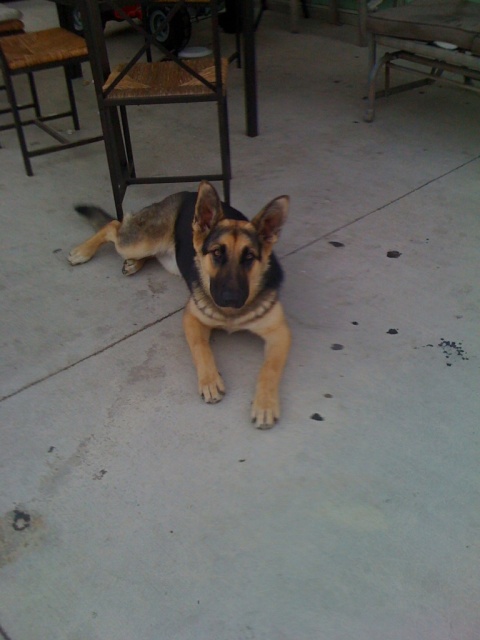 6 month pup
Question6 month old female
QUESTION: I was offer
6 month pup
Question6 month old female
QUESTION: I was offer
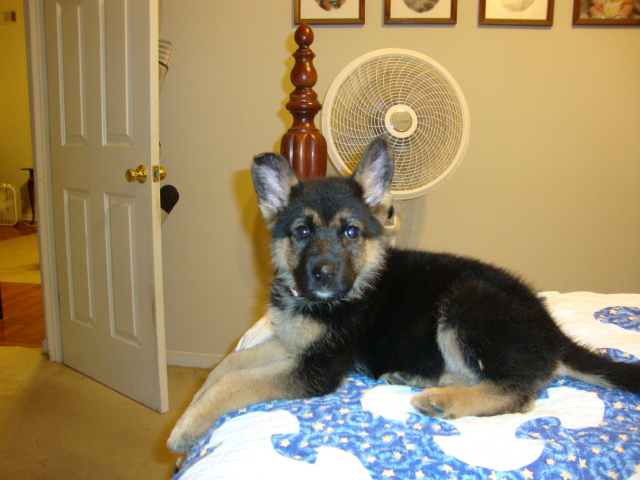 puppy wont eat
Question
ava 8weeksweeks
i have a purebred german sheph
puppy wont eat
Question
ava 8weeksweeks
i have a purebred german sheph
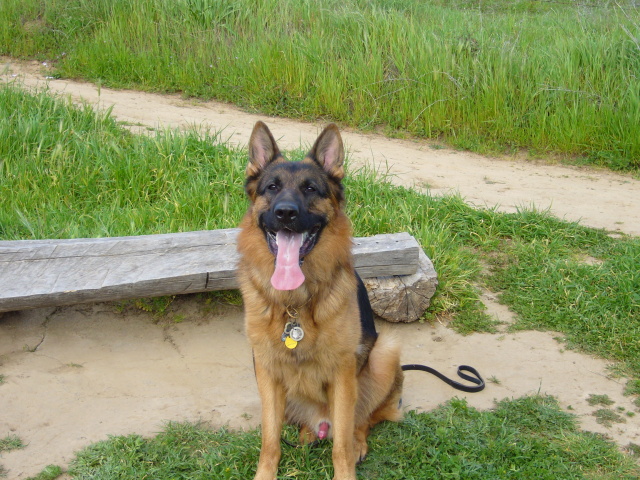 Aggression
Question
Ray
Hello, I need help...I lost my female GSD
Aggression
Question
Ray
Hello, I need help...I lost my female GSD
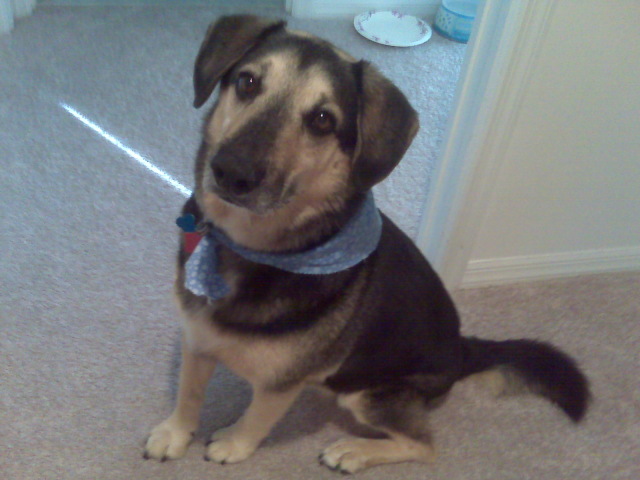 German Shepherd Mix Food
Question
Harley
Hello,
I have a 6 1/2 year old German S
German Shepherd Mix Food
Question
Harley
Hello,
I have a 6 1/2 year old German S
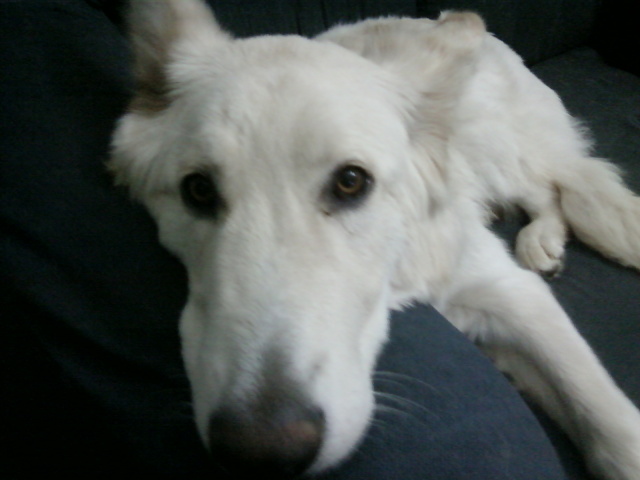 A traumatic experience
Question
Kelsie
Hi, we have two dogs and the second one
A traumatic experience
Question
Kelsie
Hi, we have two dogs and the second one